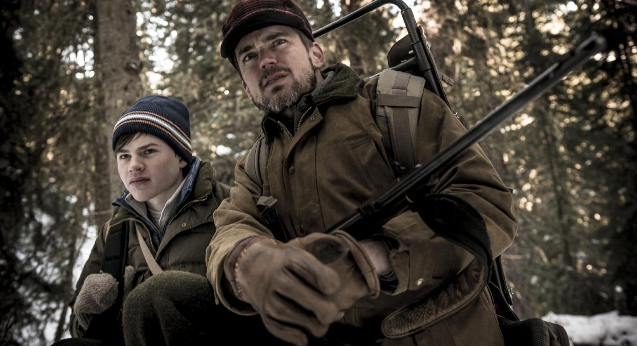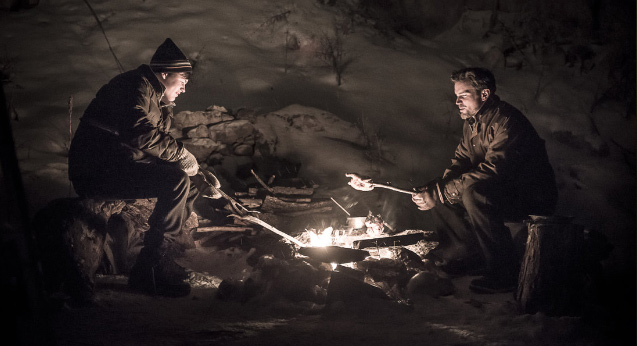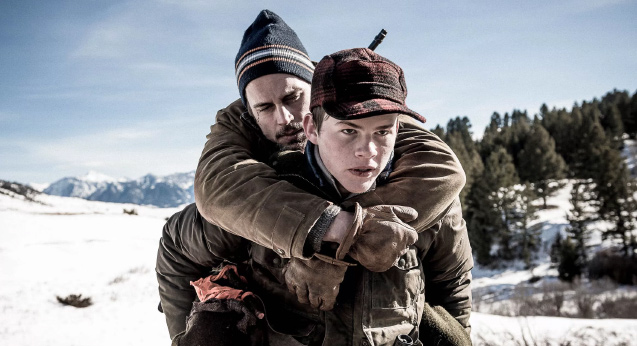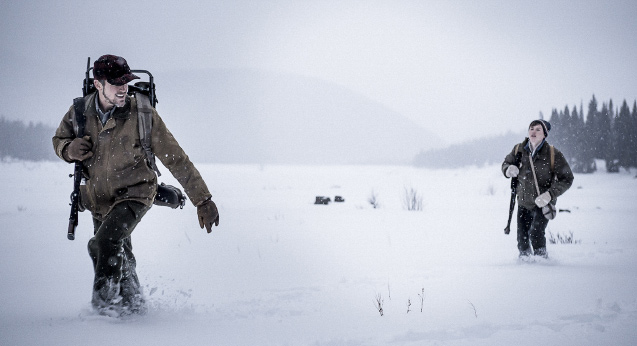Matt Bomer talks survival drama Walking Out

Walking Out, in cinemas now, adapts a classic short story by David Quammen. Matt Bomer (Magic Mike, The Nice Guys, TV’s American Horror Story) plays Cal, whose hunting trip with semi-estranged son David (Josh Wiggins) turns into a fight for survival in the freezing mountains of Montana. Bomer spoke with us about the film from the sunnier climes of California.
FLICKS: Can you remember what it felt like to be in that snow still?
MATT BOMER: I loved it, to be honest with you. I fell in love with Montana the moment I set foot on the soil there. I met with the filmmakers before we were deciding whether to do the project or not, and we went on a fishing trip together. We met up with some outdoorsmen, some local-flavour outdoorsmen. And that sky there is breathtaking, and the landscape there is incredible. And in terms of the cold and the snow, as an actor, there are times I’d prefer to have that sort of experience or shoot as opposed to having to imagine it on a sound stage and pretend like you’re cold sitting on a sound stage that’s 75 degrees.
Yeah, I liked it. I only have good memories, even on the cold days. All my memories there are really great ones. Nothing scarred me. We had a really responsible costume department [laughs] who found creative ways to try and keep us warm. So no one got hypothermia or frostbite or anything, and we had a great time there.
It wasn’t a pressure shoot by any stretch of the imagination. There were no trailers or cast chairs or anything like that. You basically just stood in the snow until it was time to do the next scene, and then you did that scene, and then sit in the snow until it was time to do the next scene. And I actually prefer to work that way.
How different was the shoot from what you were working on in the weeks or months leading up to going on location?
Well, for the first third of the movie, basically, I was doing American Horror Story at the same time, so it was about as different as you could get, I imagine [laughs]. That’s a show that has a lot of money and is a pleasure to work on as well, but they have the luxury of all the time in the world and all the money in the world. And the movie I was walking into was incredibly independent in the best way. So it was sort of two different ends of the financial comfortability realm in terms of filmmaking.
What was it like to then be back on a sound stage?
My job as an actor is to adapt to whatever process that a director or a showrunner creates on any given movie or TV show, so you roll with it. You accept it, and then do the best you can with the circumstances you’re given. I personally prefer the kind of independent experience because there isn’t a great deal of bureaucracy weighing in at the monitor, and people can’t afford to be late or really misbehave. You’ve got to be there for the love and for the work and get it done and know your shit, really [laughs]. So I prefer to work that way. But I also have had great experiences working on movies that had a lot of money, as well, and all the time in the world, so it’s just part of my job to adapt.

Is it different experience in a film like this? Is there more pressure when it’s you and one other person on screen for the duration?
Well, I actually loved it because you’re kind of right in the story. You’re right in the pocket. I think it’s actually more difficult when you’re bouncing in and out every few days or once a week or once every other week and trying to figure out what movie you’re in and what’s going on around you. I much prefer to have to be in every scene only for the simple fact that my homework is kind of being done for me as we go. I know who I’m relating to. I know what’s happened. If we shoot sequentially, I know what’s happened before. The history is built into the latter scenes if you film it in chronological order. So I like that. And I think there’s actually less pressure on a movie like this with a smaller budget because everyone’s there doing it for the love. I felt really comfortable in the hands of these filmmakers. I think they’re artists to their core. I think it’s more pressure if you’re having to front a movie that costs $40 million and you go, “Oh, man. If this doesn’t open well, what’s going to happen to my career?” When you’re doing an indie, there’s no promise that it will open at all or get distribution or ever be seen. So I think it’s more pressure on a big budget movie, to be honest with you.
When it comes to selling, particularly, the third act of the film where the physical pressure of being out in the wilderness is kicking in for you guys, how challenging was that process, a performance which was very nonverbal?
Well, my character had done quite a bit of talking up until that point [laughs], so to be honest with you, I was quite happy to not be talking for a few pages! I loved it because then I could really just focus on the physical and just be in the moment on every scene because you’re not ever having to think twice about what to say. You can just behave. And it poses interesting challenges like, how do we tell the story and have characters redefine their relationships without words to be spoken? How do we do that in the simplest, most raw, real way possible? And yeah, I like those challenges as an actor.
I did say nonverbal, but there is quite a lot of ADR grunting going on in some of those scenes…
I don’t know how much of it was ADR and how much of it was real, to be honest with you.
Yeah. I guess you are literally slogging through the snow as you’re shooting
It’s an interesting circumstance. Oh, my gosh. There was one scene that we had to take a snowmobile to get up to the top of this mountain, and the locals who brought us up there couldn’t remember the last time humans had been up to this part of the mountain [laughs], if ever. So poor Josh was having to slog through about three or four feet of snow with me on his back. A big part of my physical life was trying to lose as much weight as possible so this poor kid didn’t break his back.
But yeah, I mean, it’s interesting. It comes from this very famous short story that David Quammen wrote, that I love. And it’s one thing in a short story to have someone carry someone else on their back who is injured for 20 pages of a short story, but then to do it for 40 pages of a movie, that’s a lot of pain and grunting to be in for a good portion of the film.

That’s a very literal and physical way to form a bond with a castmate, isn’t it?
My experience in this movie, other than a couple of things I did on my own, was just me and Josh. I met Bill Pullman later, and there’s some great flashbacks, but I never saw him when we’re on set. I never really saw anybody else other than the crew, and the directors, and producers, and Josh. But we’re from the same small town, so we had an automatic kind of kinship because of that. And he’s just a wonderful actor and artist, and a really open person, and humble and talented, and so we had a blast together.
Do you get much time to prepare with a co-star on a film of this size, or are you really both kind of feeling your way into your roles as things are getting underway?
No, not at all. I think we filmed our first scene together maybe within minutes of meeting each other.
That kind of plays into some of the sense of distance between the characters, right?
Yeah, which is helpful. It wasn’t that early on. It was when we went grouse hunting together. It’s in the first act of the film, and he’s having a hard time. So we did that entire sequence right after meeting, over the course of a day. And at that point, you’re just having to trust that the person you’re working with has done their homework and you’ve done yours and that it’ll all play out once the cameras roll. But it was nice because the conversation and the bonding is kind of jagged and slow, so it worked out well.

The film has both common and very intensely personal aspects of people’s relationships with their fathers. Was there a lot of sharing between yourself and the filmmakers and Josh about the things that really had that special significance for you in the script?
I think a lot of that happened before we were shooting, before cameras were rolling, so that we were on the same page. Even in the initial meetings, you talk about parts of yourself or your life that relate to the script and what you understand about the script that’s going to help you tell the story. I mean, if I didn’t feel like I knew who Cal was from my own life, from my own experience, I never would have been bold enough to even attempt to be a part of this movie. But there were parts of my upbringing and my family that were really resonant in the story.
So most of it’s done before the cameras roll. On this job, sometimes, it’s happening in between takes, but we didn’t have the time for that. And then there’s also times when you just know something in your gut, and so you have to just kind of have to stick to your guns as the story’s being told. But yeah, [directors] Alex and Andrew are so great and so collaborative and so comprehensive that a lot of that work was done before we even got there. And then they’d watch the dailies and talk about things they liked and what was working or what you could adjust and things like that.
Does the overall feel on a set differ at all when you’ve got co-directors – in this case, brothers – behind the camera?
Well, let’s also mention twin brothers [laughs].
We’re in very specific territory…
Really specific! I have twins. Twin boys, who are fraternal like Alex and Andrew. So to me, it was amazing to witness their collaboration, and I only hope that our twins grow up one day to work together in that capacity in the way they do. And I think the fact that I have twins also helped me to relate to them in a more effective way on set because being twins, there were times they had different ideas about things, and I would– just as I do with our twins from time to time — I’d say, “Hey, you guys, go work it out, and then come back to me [laughs] and we’ll figure it out together.” And that’s what we did.
But it was surreal in some ways, having twins myself, but it was also very natural and organic. And I loved it. I love having an extra set of eyes and ears on the scene at any given time. And they have a great methodology, in terms of how they deal with the actors and how they divide and conquer. And there were times when Andrew would mostly be working with Josh, and Alex would mostly be working with me. And then there were times they both weigh in, and so it was scene-by-scene, but I loved it. I loved having twins direct.
They sort of divvied up the characters so that we could make the most use of our time. And I loved it. It’s a really unique experience, and I would work with them and do it again in a heartbeat.
Find times & tickets for ‘Walking Out’
















